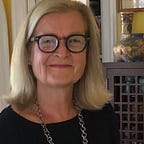The Empowerment of Bed Making During the Pandemic
Creating Order in A World Turned Upside Down
I am usually up before my husband — almost done with coffee and the newspaper before he emerges. But when he does, I make the bed. Almost before I do anything else. With a duvet, just a quick fluff leaves the blanket neat and the pillows plump and upright against the headboard.
I’ve always had this bed-making thing. No matter when or where I had to go, I hated leaving with the bed unmade. Finding it in its disheveled state upon my return, I would have to make it — no matter how late — if I was to settle in and go to sleep.
As the pandemic rages on, we have been sheltered at home for months. Even without young children, the increase in household chores (cooking, grocery procurement topping the list) is daunting. But my bed-making remains undiminished. In fact, the need has grown.
If there is such a thing as bed-making DNA, I may have inherited more than my fair share. Where I grew up, the beds were always made. My mother — a compulsive housekeeper — also ironed underwear and sheets. And wiped down the walls after every shower. On her watch, dust didn’t dare accumulate. Though resistant to extravagance, she owned what was then, the “Mercedes” of vacuum cleaners — an Electrolux. And seemed to absorb the demonic energy with which she vacuumed directly from it.
My parents were holocaust survivors. There was much I would never know about the dark world they had escaped. And how they found the strength to move forward. But eventually, I understood that a pristinely clean home was how my mother made order in her universe. She claimed she did not really believe in God, though I often heard her argue with him (think Tevye in Fiddler on the Roof). If cleanliness could be a religion, she was a zealot.
I remember trying to make my bed when I was older. Probably so she would spend less time in my room. Our blankets were duvets. How hard could it be? She stood at my door shaking her head. And said to herself in Yiddish (which I understood) loud enough for me to hear, “Looks more like a grave…”. I had never thought about graves or what they might look like. But it was clear that my efforts did not achieve the esthetic she had in mind. I didn’t debate her verdict. I simply ceded control. With a few swift, smoothing motions, she was satisfied — her world order restored. I didn’t ask why she imagined graves when the object in question was a bed. But remembering it in the telling, it makes sense now.
Fast forward a life-time. We are in a world turned upside down. I know it is not even close to the darkness my parents survived. Yet lessons can be drawn. I find hope and strength in creating order within my own small universe. I make our bed with a newly found fervor. Each pat and pull and fluff conjures a ‘normal’ I long for. As the day goes on, I admire it in its neat, orderly state when I walk by. A reassurance that some things — simple and soothing — remain in place.
